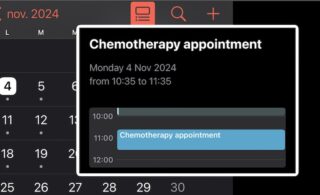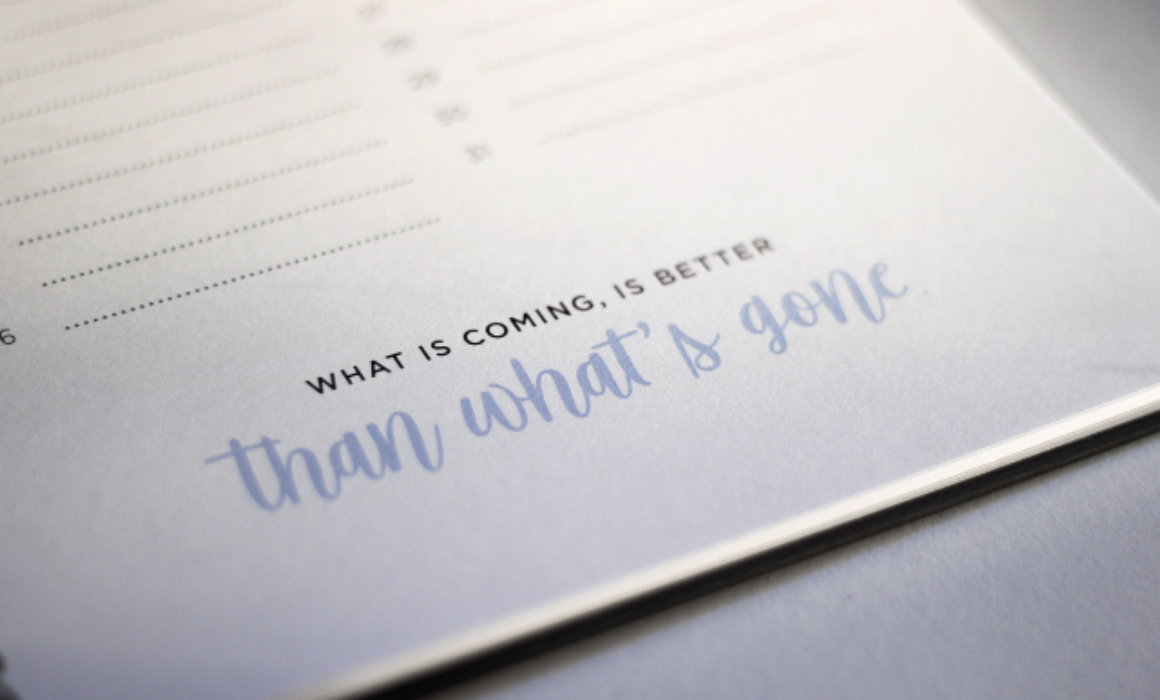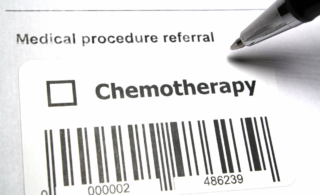
Everyone experiences chemotherapy differently. There are quite a lot of possible side effects that come with chemotherapy and the chances are that you will experience at least some. When it comes to side effects, your oncologist and chemo nurses will want to ensure that a) you are not having a reaction to the drugs; b) you are not suffering from an infection; and c) you are as comfortable as possible.
We’ve put together this article from our experience as patients but we encourage you to speak to your medical team about your personal situation.
Top ten points to remember
1. ALWAYS call the hospital, oncologist or GP if you are worried about any chemotherapy side effects. Make sure you have day and night contact numbers loaded into your phone and written down somewhere around the house for others to see. If you are unsure about whether or not to call with a question or concern, just make the call. Don’t worry about calling. It is better to call and allay your fears than to sit worrying about it.
2. You might be given a list of side effects for which you’re recommended to call the chemotherapy ward if you experience.
3. You will be told to keep an eye on your temperature which if exceeds a certain temperature (usually 37.5 or 38 degrees Celsius) or goes below a certain temperature then you have to call the nurses or hospital straight away. Invest in a good quality digital ear thermometer to make sure you get an accurate reading. This is effectively to make sure that you don’t have an infection for which you will need antibiotics. (Remember that you have a low immune system during chemotherapy treatment and you will need antibiotics if you pick up an infection.)
4. Keep a daily journal after each cycle of chemotherapy, recording all side effects. This means you can look back to compare how you were feeling after each cycle. For example, on day 3 after cycle 4 you can look back and see if you are feeling the same as you felt on day 3 after cycles 1, 2 and 3. You’ll see if you have something different to usual and you can ask you chemo nurses about it if you are worried. There are free phone Apps which allow you to record this information on your phone. Vinehealth, OWise and Chemo Wave are all options.
5. Different chemo drugs have different side effects. The Cancer Research UK website has an excellent resource which lists each of the breast cancer chemotherapy drugs and provides information on common, occasional and rare side effects and what to do if you have them. Bookmark this page or print it out. This is something that you can refer back to over the course of your treatment. But remember to call you chemo team with any concerns.
6. Try not to worry or get stressed about the side effects of your chemotherapy because that will make you feel worse. Try to relax (see the tips on relaxation) and distract yourself (see the tips on distractions).
7. Online forums and Facebook groups are an excellent place to ask other breast cancer patients for their suggestions and tips on how to alleviate side effects. And also to just chat to others going through the same thing as you (see the section on Support Groups and Online Forums). But remember that: a) Different breast cancer chemotherapy drugs have different side effects, b) People react differently to the drugs and may have different side effects to you, c) Any sign of an infection – call one of your chemo contact numbers, and importantly, d) the people in these groups are not medical professionals so always check with your medical team.
8. Remember that the side effects will pass eventually. Some of the side effects can linger around, possibly for up to six months after chemotherapy ends, for example brain fog and fatigue.
9. The Macmillan and Breast Cancer Care helplines are there to help with any concerns. Macmillan: 0808 808 0000. Breast Cancer Care: 0808 800 6000.
10. Your medical team is there for you. Always speak to your medical team about concerns.
Tips for dealing with the more common chemotherapy side effects
Sleep problems. You may have trouble sleeping during chemotherapy. This can be due to a variety of factors including stress, anxiety and steroids. Try some of the relaxation techniques suggested in the section on relaxation (see our tips on relaxation).
Sore mouth.
- Your mouth can feel different: furry or sore. You can get mouth sores and ulcers. Sometimes the soreness can extend a little way down your throat which means it is hard to tell the difference between a throat infection and a dry throat. To be on the safe side it is best to get all sore throats checked out by the hospital.
- A soft toothbrush, Aloe Vera toothpaste and mouthwash can help because they are gentler than regular toothpaste and mouthwash.
- We have included some advice about things to eat/not eat with a sore mouth in the section on Eating and Drinking Your Way Through Chemo.
Nausea.
- Try wearing travel sickness bands (ask your chemo nurses if it’s okay to use these on an arm where lymph nodes have been removed).
- Try some relaxation techniques (see the tips on relaxation).
- Ask your chemo nurses for more/different anti sickness meds.
- Look at the tips to Eating and Drinking Your Way Through Chemo.
Taste changes. Look at the tips to Eating and Drinking Your Way Through Chemo.
Constipation. Yes let’s talk about poo shall we! Your chemotherapy nurses can recommend a laxative which will depend on which chemo drug you are on. Make sure you are drinking plenty of water. And you can try a natural remedies such as prunes, homemade fruit and veg smoothies, more fibre and fresh fruit and dried fruit. And depending on your chemo drugs, you may go the other way and experience loose bowel movements. Talk to your chemo nurses and oncologist about how to help with this.
Weight gain. Steroids, lack of exercise and an increased appetite can all contribute to weight gain as a chemotherapy side effect. But if you are worried talk to your chemo team and take a look at Macmillan’s advice.
Hair loss. We have a whole section on hair loss because it is such a big thing for us to experience during treatment.
Aching joints and bones. Some chemo drugs can make your bones and joints ache. Some people don’t get any pain, and others get quite severe pain. The best advice is to ask your nurses and oncologists what you should do about this.
Fatigue. Oh my! The extreme, constant, mind-numbing, excruciating, frustrating, all over, top to toe tiredness. Tiredness doesn’t even being to explain it. To help alleviate the fatigue you can try:
- Exercise. A couple of gentle short walks a day can actually make you feel better and give you a little bit more energy.
- Relax. Try some of the relaxation tips (see our tips on relaxation) at bedtime to try to get a good night sleep.
- Eat healthily.
- Drink plenty of fluids like water and herbal teas.
For more advice ask your chemo team or take a look at this advice from Breast Cancer Now.
Chemo brain. The ultimate chemotherapy side effect. Chemo brain is the term given to the way in which your brain turns into a sieve (we have a whole article about it here) Symptoms range from memory loss, difficulty finishing sentences and not being able to think of the right word. Some people are not affected and others get it quite badly. It should improve or disappear within a year of ending treatment. Macmillan has some good information on it and how to help plan your day taking chemo brain into account.
Dry and/or sensitive skin. Your skin can get dry and sensitive as a result of the chemo drugs. Our tips for this are:
- Moisturise all over every day.
- Choose gentle skin care products (shower wash, moisturiser, face cleanser, moisturiser etc) for sensitive skin.
- Use sunscreen with a high protection factor – there are some good paraben-free and organic ranges available if you want something gentler on your skin.
Indigestion and heartburn. Check with your chemo team what you can take with the regime you are on.
Discoloured and/or ridged nails. Unfortunately our finger nails (and toe nails) don’t escape the side effects. Some chemo drugs cause them to ridge, sometimes the nail beds hurt and go brown, they can get brittle and break easily, completely lift off or just generally get in bad shape. Some drugs react to sunlight and can cause damage to the nail bed. If you see any signs of nail infections let your doctor/nurses know straight away. (Take a look at the section on makeup for more tips on nails)
- Use a handcream.
- Use a nail oil or moisturiser.
- Keep nails short and well maintained.
- Wear gloves for things like washing up and gardening.
- Don’t have a manicure or pedicure – this is to avoid the risk of infection (remember your low immunity and possible risk or lymphoedema)
- Avoid nail gels and acrylics because they will weaken the nails more (and sometimes bacteria can get between the nail and the coating, causing infection).
- Use a non-acetone based nail polish remover.
- For some people, wearing a dark colour nail varnish helps protect the nails because it provides a barrier between the nail and sunlight. If you are using nail polish then consider using one which is free from some of the harsh chemicals usually found in nail polish.
Pins and needles in fingers and toes (neuropathy). Some chemo drugs can cause a pins and needles feeling or numbness in the tips of your fingers and toes. For this one make sure you tell your chemo nurses/oncologist so they can keep an eye on it.
Heightened sense of smell. This is a weird one. Sometimes your sense of smell can become really acute.
Menopause. It’s not enough for life to throw breast cancer at us. We then have to deal with a host of chemo side effects. And the cherry on top is the menopause. Some of the chemo drugs can cause an early menopause. And if you are having hormone therapy then that can also cause the menopause to kick in. See the section on the menopause for tips and information. Sometimes your periods can stop during chemo, but come back once chemo is finished.
Emotional rollercoaster. It is perfectly normal to feel scared, worried, anxious, terrified, upset, sad, unhappy, tearful, plus a whole host of other emotions. Many hospitals provide counselling services for their breast cancer patients so don’t be afraid to ask your chemo nurse or breast care nurse. There are other places where you may find counselling services (often free of charge):
- Local cancer hospice – these often provide support for people living with cancer without a terminal diagnosis. It is worth calling up to find out.
- Local cancer charities.
- Your local Macmillan cancer centre – you can do a search on the Macmillan website to find local information, support centres, local support groups and practical help. You just pop in your post code and then click on “filters” to tick these two boxes.
- Breast Cancer Care helpline 0808 800 6000
- Macmillan helpline 0808 808 00 00
- In the Useful Links and Resources section there is a list of some regional breast cancer charities and advice centres. One of these may be close to you, but if not then many of them offer free telephone counselling or advice.
- You can download or order a copy of the Breast Cancer Now booklet on coping with the emotional issues of breast cancer here.
- Macmillan in partnership with BUPA also offer 6 free counselling session and can be found at Free specialist counselling for people with cancer | Macmillan Cancer Support
- Future Dreams offer some counselling services check out the options here – you can browse the different sections of the bookings pages.
Immunity boost injections. If you are on one of the chemo drugs that requires you to have one, or daily, immunity boosting injections then these can cause “flu like symptoms”.
Further information
A helpful online resource with more information on side effects generally is the Breast Cancer now website.
The Cancer Research UK website has an excellent resource which lists each of the breast cancer chemotherapy drugs and provides information on common, occasional and rare side effects and what to do if you have them. Bookmark this page or print it out. It is is something that you can refer back to over the course of your treatment. But remember to call you chemo team with any concerns.
The Cancer Research UK website also has a list of possible side effects of cancer treatment in general and how to alleviate them (bear in mind that this list covers treatment for all types of cancers so some will not be common for breast cancer treatment).
Other excellent resources are the nurse helplines on the Macmillan and Breast Cancer Now websites.
Future Dreams hold a range of support groups, classes, workshops and events to help you and your carers during your breast cancer diagnosis. These are held both online and in person at the London-based Future Dreams House. To see what’s on offer and to book your place, see here.
To return to the homepage of our Information Hub, click here where you can access more helpful information, practical advice, personal stories and more.
Reviewed February 2023
The information and content provided on this page has been written from a patient’s perspective then reviewed by a breast care nurse and it is intended for information and educational purposes only. It is not intended to substitute for professional medical advice. Please contact your medical team for advice on anything covered in this article and/or in relation to your personal situation. The links and/or recommendations in this article to third-party resources are for your information and we take no responsibility for the content contained in those third-party resources. Any product recommendations made in this article are not product endorsements and unless otherwise stated, they are made without any affiliation to the brand of that product. We ask you to note that there may be other similar products available.
Share

Support awareness research
Donate to those touched by BREAST cancer
Sylvie and Danielle began Future Dreams with just £100 in 2008. They believed nobody should face breast cancer alone. Their legacy lives on in Future Dreams House. We couldn’t continue to fund support services for those touched by breast cancer, raise awareness of breast cancer and promote early diagnosis and advance research into secondary breast cancer without your help. Please consider partnering with us or making a donation.



